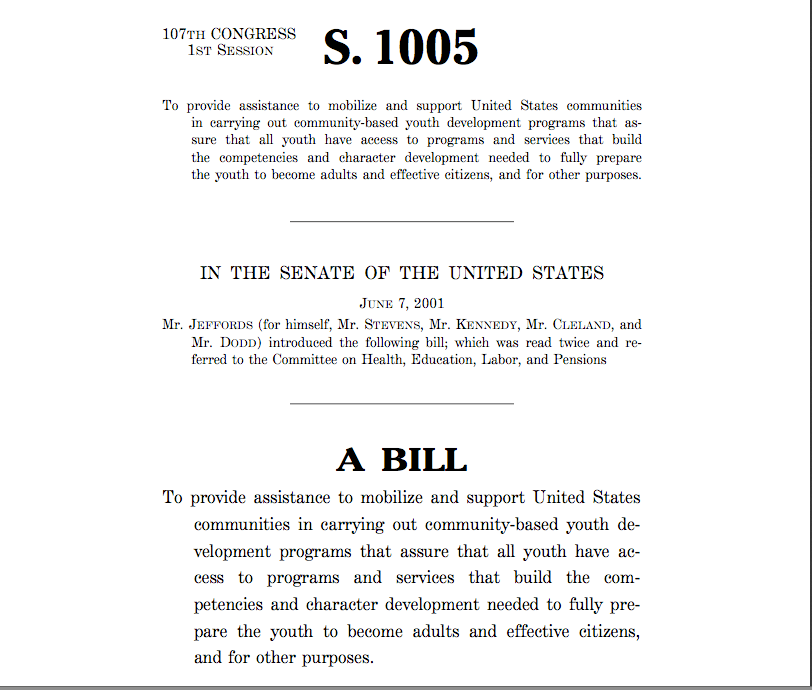Former Sen. Jim Jeffords, who served the people of Vermont for three decades in Washington, passed away today at the age of 80.
There is no doubt that Jeffords will be most remembered for his defection from the Republican Party in 2001, just as the G.O.P. had gained control of the White House and both chambers of Congress. Jeffords’ decision to become Independent and caucus with the Democrats was spurred in part over his disagreement with former President George W. Bush over funding for the Individuals with Disabilities Education Act.
To some he will be remembered as a turncoat; to others, a political savior. But Youth Services Insider will remember Jeffords for a different reason. He and his staff – in particular Kimberly Barnes-O’Connor – were the chief architects of the Younger Americans Act (YAA), a bill that would have created a massive block grant to states aimed at building the assets of disadvantaged and low-income youth.

The Younger Americans Act would have created a flexible block grant for states to direct to community-based organizations
It was and is a much-needed counterpoint to the targeted dollars directed to education, foster care, and to a lesser extent juvenile justice. The idea was simply to take about $6 billion; determine state allocations based on their 10- to -19-year-old population; and then allow states to distribute 95 percent of the money to community-based organizations.
In 2001, YAA looked like a done deal. It had bipartisan support from major players in both chambers. It had the backing of then Secretary of State Colin Powell, who had championed YAA at chairman of America’s Promise before joining the Bush Administration. And the $6 billion price tag would draw howls from budget hawks now, but not so much against what was then projected to be a multi-trillion dollar budget surplus.
So what happened? A lot of stuff. Jeffords left the Republican Party, which cost him O’Connor and most of his staff, who were critical in building momentum for the bill. It turned out the Senators who led the Health, Education, Labor and Pensions Committee – the late Ted Kennedy and the since-retired Chris Dodd – were not as motivated as Jeffords to push the bill.
And that was all before the Sept. 11 attacks froze the country in its tracks.
YSI had not heard much about YAA until a 2012 conference held by the Alliance for Children and Families. Speaking on the first day, Alliance CEO Susan Dreyfus hinted in her keynote address at the idea of bringing YAA back as a policy goal. The Alliance has yet to formally push that agenda.
Did Jeffords’ party switch doom the millennial push for YAA? Hard to say. It retained Republican sponsors after his switch, so maybe not.
What is certain is that YAA, as proposed in 2001, would have changed the face of youth services in this country. Look at the current child welfare financing debate, stuck somewhat on the subject of flexibility and how states can better serve families in crisis without surrendering an entitlement. Look at the many states slow to downsize juvenile incarceration, and the ones that are scrimping together state savings and foundation largesse.
YAA could have been the buffer in both of those movements.
At any rate, today the nation lost a statesman who cared very much about the education and positive development of America’s most vulnerable and disadvantaged youths.
Youth Services Insider is mostly written by Chronicle Editor-in-Chief John Kelly.


